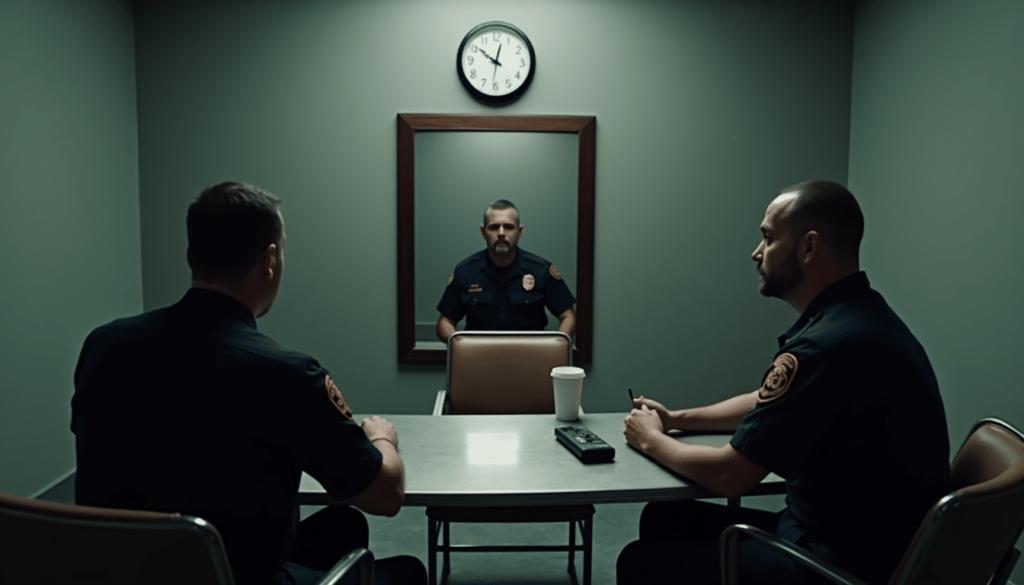
The belief that police must read Miranda rights during every arrest is false. This common misconception about Miranda rights shows a significant gap in the public’s understanding of constitutional protections. Law enforcement only needs to inform suspects of their rights under two conditions: when they’re in custody and being interrogated.
These fundamental rights came from the 57-year-old Supreme Court case Miranda v. Arizona, but people still misunderstand them. The Supreme Court ruled in 2013 that a suspect’s silence could be used against them in court if they hadn’t clearly stated their right to remain silent. This knowledge gap creates serious problems.
This piece will show what police officers don’t tell you about Miranda warnings and teach you how to properly use your rights. Understanding these protections is vital for anyone who deals with law enforcement.
What Miranda Rights Really Mean
Miranda rights are the foundations of the U.S. Constitution’s Fifth and Sixth Amendments. We protected people from self-incrimination and gave them access to legal counsel. These protections became standard police procedure after the landmark 1966 Supreme Court decision in Miranda v. Arizona.
Basic rights explained in simple terms
Your Miranda rights give you four key protections:
- The right to remain silent
- The warning that anything said can be used against you in court
- The right to have an attorney present during questioning
- The right to have a court-appointed attorney if you cannot afford one
What these rights apply
You should know that Miranda rights only apply in specific situations. These protections work only during custodial interrogation – you must be in custody and under questioning. Custody means you can’t leave freely, like being arrested or having your movement restricted by a lot.
What police must tell you
The exact wording might change depending on where you are, but police officers must clearly tell you all four basic rights before they start questions. Police must make sure you understand these rights and they often ask “Do you understand the rights I have just read to you?”. On top of that, they must check if you want to answer questions without having a lawyer with you.
The Supreme Court doesn’t make officers use specific words. Officers just need to make sure the warning explains your rights clearly so you can make an informed choice to give up these protections. Most officers will verify that you understand, and some police departments need confirmation after reading each right.
Common Police Tactics During Questioning
Police officers use sophisticated psychological tactics to get information from suspects during interrogations. Modern law enforcement relies on subtle psychological techniques instead of physical intimidation to gather evidence.
How officers minimize rights importance
Officers often downplay Miranda warnings by treating them as mere formalities or bureaucratic requirements. They might suggest that working with them without a lawyer will make things easier. A common tactic labels Miranda warnings as “just a box on a bureaucratic checklist” – the Supreme Court has explicitly condemned this strategy.
Friendly conversation trap
Creating an illusion of informal, friendly conversation is the most effective police tactic. Officers achieve this through:
- Presenting the interrogation as a routine investigation
- Making it clear the person is “free to leave” – specifically to avoid Miranda requirements
- Starting casual questioning before formal arrest
These informal conversations benefit law enforcement because many people don’t realize they’re suspects when no arrest has occurred. Officers might then use “minimization” techniques that downplay the situation’s seriousness while suggesting confession benefits the suspect.
A deceptive approach happens when officers claim they can “help” if suspects cooperate. This might seem true at first, but it doesn’t stop later arrests or charges for admitted crimes. The Reid Technique, a common interrogation method, heavily depends on this presumption of guilt and psychological pressure.
Note that police can use anything you say as evidence, even without reading Miranda warnings. The gap in experience between detectives and suspects creates an unfair situation where uncertainty and fear lead to both false and true confessions.
Smart Ways to Invoke Your Rights
Your silence alone cannot protect your constitutional rights. The Supreme Court has ruled that suspects must verbally and unequivocally assert their Miranda protections.
Clear phrases to use
You need specific, unambiguous statements to invoke your rights properly. These clear phrases will help:
- “I am invoking my right to remain silent”
- “I want to speak to my attorney”
- “I will not answer questions without my lawyer present”
- “I am claiming my Miranda rights”
What happens after you invoke
Law enforcement must immediately stop all questioning once you clearly invoke your rights. This protection varies based on which right you assert. Police may resume questioning after a lengthy break and only about different crimes if you choose to remain silent. You must have your lawyer present before any interrogation can continue if you request an attorney, unless you voluntarily restart the conversation.
Common mistakes to avoid
Staying quiet without explicitly stating you’re invoking your rights is the worst mistake you can make. Vague statements like “Maybe I should talk to a lawyer” or “Do I need an attorney?” won’t protect you. People also make the mistake of continuing to answer questions after invoking their rights – even innocent-looking responses can be used against you.
Stay polite and composed while asserting your rights. You should document the interaction whenever possible because this evidence could prove valuable if disputes arise about whether officers respected your rights properly.
Real Consequences of Speaking vs Staying Silent
Talking to law enforcement without proper legal representation can affect your criminal case forever. We learned that anything you tell officers becomes permanent evidence you can’t take back or change.
How statements get used in court
Prosecutors will inspect every single word you share with police and look for details that help their case. A simple chat with officers can turn into crucial evidence. What seems harmless during questioning could become a powerful weapon for prosecutors later.
Police officers often use recorded conversations as evidence in ways suspects never meant their words to be used. These statements help prosecutors to:
- Guide criminal investigations in specific directions
- Prove guilt during trials
- Affect sentencing decisions after conviction
Benefits of remaining silent
Studies prove that keeping quiet gives you real protection. Research on criminal cases shows that false confessions played a role in 27% of overturned murder convictions. Your innocent comments can be twisted or misunderstood, which could make the prosecution’s case stronger.
Staying quiet lets you keep control of your defense strategy and stops you from saying things that could hurt your case. You’ll have time to talk with your lawyer and make smart choices about what you might want to say later.
The evidence makes it clear – staying quiet until you talk to a lawyer will protect your legal rights best. This approach stops law enforcement from using your words against you and will give you the best chance to protect your interests.
Conclusion
Miranda rights serve as a vital shield that protects you from self-incrimination when dealing with police. Police officers might downplay these protections or treat them as simple formalities, but they matter more than you think.
Evidence clearly shows that suspects who talk without a lawyer put themselves at risk, whatever their innocence. People who stay silent keep control of their defense strategy. Those who choose to talk often see their statements twisted or misused when they go to court.
Here’s everything you should know: Miranda rights only work during custodial interrogation and you must clearly state them out loud. You just need specific phrases like “I am invoking my right to remain silent.” The police want to create casual conversations that skip these protections, so you must know how to properly invoke your rights.
Without doubt, the best strategy combines being polite yet firm – tell them clearly that you’ll stay silent and want a lawyer. This approach stops any collateral damage while protecting your constitutional rights. Every word you say to law enforcement becomes permanent evidence that could change your case’s outcome.
Call Us 24/7
Request Your Free Consultation
FAQs
Q1. When do Miranda rights apply during a police encounter?
Miranda rights apply specifically during custodial interrogation, which means you must be both in police custody and under questioning. This typically occurs when you’re not free to leave, such as during a formal arrest or when your movement is significantly restricted.
Q2. How should I properly invoke my Miranda rights?
To properly invoke your Miranda rights, you must verbally and unequivocally assert them. Use clear phrases like “I am invoking my right to remain silent” or “I want to speak to my attorney.” Vague statements or simply remaining quiet without explicitly stating your intention are not sufficient.
Q3. Can police question me without reading my Miranda rights?
Yes, police can question you without reading Miranda rights in certain situations. However, if you’re in custody and being interrogated, they must inform you of your rights before questioning. If they fail to do so, any statements you make may be inadmissible in court.
Q4. What are some common police tactics during questioning?
Police often use psychological techniques like minimizing the importance of Miranda warnings, presenting interrogations as casual conversations, or suggesting that cooperation without a lawyer will be beneficial. They may also claim they can “help” if you talk, even though this doesn’t prevent potential charges.
Q5. What are the consequences of speaking to police versus remaining silent?
Speaking to police without legal representation can have lasting implications for your case. Your statements become permanent evidence that can be used against you in court, potentially shaping the direction of investigations or impacting trial proceedings. Remaining silent, on the other hand, allows you to maintain control over your defense strategy and prevents unintended admissions.
